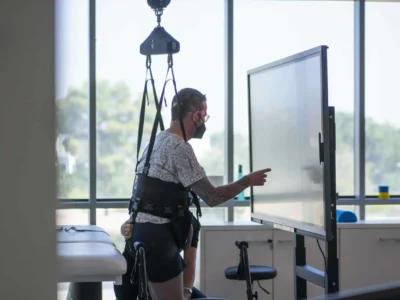Relationship between physical activity and the brain
We know that practicing sports regularly has multiple beneficial effects for our body. Being fit helps improve health, and prevents illness. At the physical level, the advantages of practicing sports are well known. For example, maintaining an appropriate weight, improving flexibility, resistance to fatigue, or muscle tone among many other benefits.
At the mental level, numerous changes also occur that are allies for our psychological well-being. Neuroscience has shown that practicing sports acts directly on brain function, preventing possible alterations. Through this article we will delve into how physical exercise improves our functional capacity and, ultimately, our brain.
Exercise, brain and neurotransmitters
There are millions of neurons in the brain that are connected to each other through an enormously complex circuit. Connection between neurons occurs through a type of chemicals called neurotransmitters. These neurotransmitters are biomolecules necessary for the transport of information.
If neurotransmitters function properly, the body and mind enter a state called regular equilibrium in the functions of the nervous system (NS). Among the various benefits that neurotransmitters provide to the organism we highlight the ability to concentrate, memory, learning, sleep quality and rest, regulation of stress, reasoning.
Below we will talk about the most important neurotransmitters that are produced and released when doing sports or physical activity:
Dopamine
Dopamine is the neurotransmitter of pleasure, and is associated with the feeling of relaxation. At the cognitive level dopamine regulates functions such as learning and memory, and plays a fundamental role in decision-making. These executive functions are vital for proper brain functioning.
Serotonin
Serotonin is also known as the happiness hormone, commonly abbreviated as 5-HT. It is responsible for regulating appetite, sleep and mood. It produces states of well-being and euphoria.
IGF-1
In this case we are talking about a type of protein, directly related to growth. When it is produced it impacts the so-called “brain-derived neurotrophic factor” (BDNF), essential in higher reasoning functions. If BDNF is blocked, capacities such as learning and memory are blocked. To try to understand it a little better, BDNF would be like the fertilizer for our brain.
Practicing sports increases the level of BDNF, directly related to the formation of new neurons in the hippocampus, a brain area intrinsically related to learning and memory. The most recent experiments point out that physical exercise combined with antidepressants increases the level of BDNF extraordinarily, by 250%.
Acetylcholine
Acetylcholine is the best ally to prevent neurological deterioration. It is responsible for muscle activation, and its main function is to improve cognitive skills.
Endorphins
They are the neurotransmitters par excellence when we talk about sports, and they also regulate anxiety. They could be considered the “drug” of the athlete. The feeling of well-being and satisfaction that is produced when they are released through physical activity is responsible for the person wanting to practice sports again the next day and experience it. There is an effect called “The runner’s euphoria”, which can be explained through these parameters.
Antidepressants or exercise?
Numerous studies with thousands of people have highlighted that the effect produced by physical activity is as effective as that produced by antidepressants (in treatments of mild-moderate depression)
One must be cautious with these investigations, which in no way suggest or recommend the substitution or elimination of prescribed antidepressants. A study carried out with people who had been diagnosed with depression for more than 7 years is very interesting.
They underwent 12 weeks of training combining cycling and running. 30% fully recovered from depression. This research also obtained data on which type of activity is most suitable to combat this disorder.
The observed results state that in the case of men intense physical exercise is recommended. In the case of women without a genetic origin in the depression it is also the most suitable. If, on the contrary, in these women’s depression there is a hereditary component or family history, a gentler type of exercise was recommended.
In short, it is widely demonstrated that exercise helps remit depressive states.
Paraphrasing the Harvard researchers responsible for these studies; exercising is not only like taking an antidepressant, but not exercising is like taking a depressant.
If you liked this article about exercise and the brain, you might also be interested in these other blog posts:
“This article has been translated. Link to the original article in Spanish:”
El deporte como mejor aliado de nuestro cerebro







 [NEW] Enhanced results navigation experience
[NEW] Enhanced results navigation experience
Leave a Reply